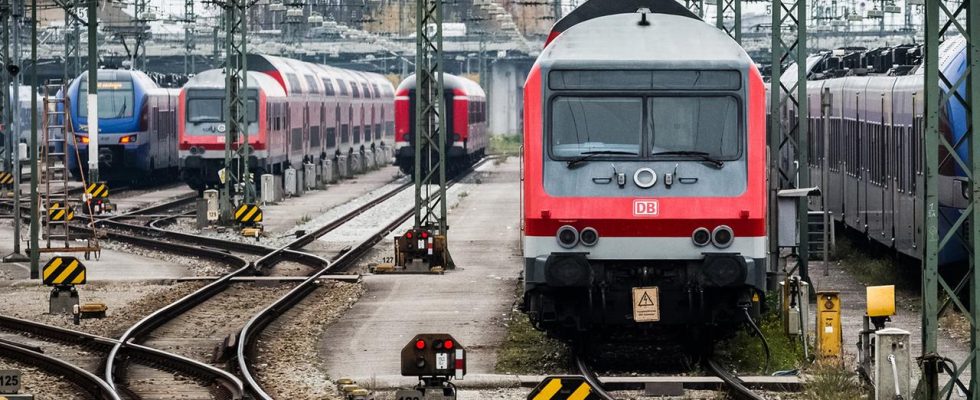Despite the Deutschlandticket – delays, canceled trains and bad connections keep many people from switching more to buses and trains. That shows the ARDParticipation campaign #better train rides.
Where there is no train, nobody can ride – travel time, waiting time, punctuality and frequency are the decisive factors for users of local public transport in Germany. That goes from the ARDParticipation campaign #BetterBahnFahren. Around 5,000 reports on the experiences of public transport users were received.
A typical statement: “There are often only few or no connections, the waiting times are correspondingly long, which also applies to the travel times, which are many times longer compared to the car.” Many draw the conclusion from this: “I will not buy the Germany ticket.” Three of four participants have been critical of local transport.Since the introduction of the Deutschlandticket on May 1, the ARD to share experiences in public transport with her.
Cost is less important
A scientific analysis of the ARD hands-on campaign now shows that most Germans will only switch from cars to buses and trains if the public transport service improves significantly. The Baden-Württemberg Institute for Sustainable Mobility evaluated the public campaign.
According to the analysis, reliability is the decisive criterion for Germans when choosing their means of transport. In the order of the most important factors, frequency comes in 2nd place and travel time and waiting time in 3rd and 4th place – ahead of fares.
Before the Germany ticket was introduced, the costs would have had far more weight when it came to the question of car or public transport, says Jochen Eckart, Professor of Transport Ecology at the Karlsruhe University of Applied Sciences, who heads the evaluation team.
Does the car stop more often?
The fact is, however, that the reliability of the railway is lacking. At the beginning of the year, 27 percent of long-distance trains were significantly delayed, in July 36 percent. And every tenth local train is more than five minutes late. Completely canceled trains or those that end their journey early are just as little included in the statistics as skipped stops.
The Deutschlandticket obviously means that cars are used less frequently. This is shown by a representative opinion poll conducted by Infratest Dimap on behalf of the SWR. According to this, 23 percent of the holders of a Germany ticket state that they drive their car less often since they got the ticket. “From my point of view, this is a surprisingly clear contribution to the required mobility turnaround,” says traffic expert Eckart.
Fuel sales at gas stations have increased
According to the ARD– Participation campaign, ten percent of people who have a Germany ticket are at least partially switching from the car to public transport. If ten percent of the users of the Deutschlandticket were to switch completely from their car to public transport, that would make a noticeable contribution to climate protection. Eckart then calculates the savings effect at around 1.6 million tons per year. That is a good one percent of the greenhouse gas emissions from the transport sector. In the case of a partial change, there are correspondingly fewer.
However, it is not yet apparent that there are fewer emissions from traffic. On the contrary: The sale of petrol and diesel did not decrease in May – the month in which the Deutschlandticket was introduced – but actually increased significantly compared to the same month last year.
That brings many Germany ticket apparently nothing
In the survey by Infratest Dimap, 42 percent of those surveyed nationwide (more than 2,700 people) stated that using the Deutschlandticket was out of the question for them. 40 percent can imagine buying it, 16 percent already have a Germany ticket.
Most (72 percent) buyers of the Deutschlandticket have previously used public transport at least once a week. According to the survey, the Deutschlandticket is mainly subscribed to by frequent public transport users, people under the age of 35 who live in urban areas.
Dominance of the car unbroken
For those who do not have a Deutschlandticket, the car is still the means of transport of choice: seven out of ten (71 percent) use their car several times a week. No wonder that 48.8 million cars were recently registered in this country – a new record.
“Customers who have really switched from cars to local transport account for between three and eight percent of new customers,” said Detlef Neuss, national chairman of the Pro Bahn passenger association. tagesschau.de: “That’s not so much, you have to say that very clearly. People don’t flock from their cars to the trains in droves.”
Traffic ecologist Jochen Eckart is less skeptical. His assessment: “The introduction of the Deutschlandticket has brought about a change in transport behaviour: the Deutschlandticket means that public transport is used more frequently and the car less frequently. However, for a change in mobility, measures must also be taken to make public transport more attractive and to reach everyone who don’t use it yet.”
The transport companies therefore urgently need to make public transport more reliable and punctual, says Eckart – and the federal states to ensure higher frequency and shorter journey and waiting times.

